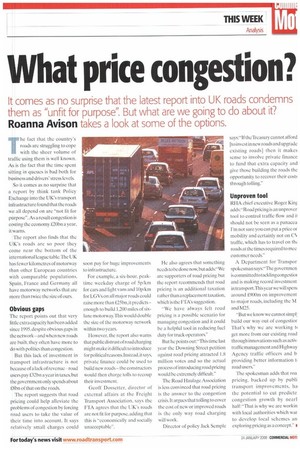What price congestion?
Page 15

If you've noticed an error in this article please click here to report it so we can fix it.
It comes as no surprise that the latest report into UK roads condemns them as "unfit for purpose". But what are we going to do about it?
Roanna Avison takes a look at some of the options.
MOM he fact that the country's roads are struggling to cope with the sheer volume of Ira Tic using them is well known. As is the fact that the time spent sitting in queues is had both for business and drivers' stress levels.
So ii comes as no surprise that a report by think tank Policy Exchange into the UK's transport infrastructure found that the roads we all depend on are "not fit for purpose". As a result congestion is costing the economy £20bn a year, it warns.
The report also finds that the UK's roads are so poor they come near the bottom of the international league table.'lbe UK has fewer kilometres of motorway than other European countries with comparable populations. Spain, France and Germany all have motorway networks that are more than twice the size of ours.
Obvious gaps The report points out that very little extra capacity has been added since 1995. despite obvious gaps in the network -and when new roads are built, they often have more to do with politics than congestion.
But this lack of investment in transport infrastructure is not because of a lack of revenue-road users pay €32bn a year in taxes, but the government only spends about £8bn of that on the roads.
rIhe report suggests that road pricing could help alleviate the problems of congestion by forcing road users to take the value of their time into account. It says relatively small charges could soon pay for huge improvements to infrastructure.
For example, a six-hour, peaktime weekday charge of 5p/km for cars and light vans and Op/km for LGVs on all major roads could raise more than £25bn, it predicts enough to build 1,200 miles of sixlane motorway:Ibis would double the size of the motorway network within two years.
However, the report also warns that public distrust of road charging might make it difficult to introduce for political reasons Instead,it says, private finance could be used to build new roadsthe constructors would then charge tolls to recoup their investment.
Geoff Dossetter, director of external affairs at the Freight Transport Association, says the ETA agrees that the UK's roads are not fit for purpose. adding that this is "economically and socially unacceptable". He also agrees that something needs to be done now, but adds:"We are supporters of road pricing but the report recommends that road pricing is an additional taxation rather than a replacement taxation, which is the ETA's suggestion.
"We have always felt road pricing is a possible scenario for managing congestion and it could be a helpful tool in reducing fuel duty for truck operators."
But he points out:"This time last year the Downing Street petition against road pricing attracted 1.8 million votes and so the actual process of introducing road pricing would he extremely difficult."
The Road Haulage Association is less convinced that road pricing is the answer to the congestion crisis. It argues that tolling to cover the cost of new or improved roads is the only way road charging will work.
Director of policy Jack Semple says:"If theTreasury cannot afford Ito invest in new roads and upgrade existing roads] then it makes sense to involve private finance to fund that extra capacity and give those building the roads the opportunity to recover their costs through tolling."
Unproven tool RHA chief executive Roger King adds: -Road pricing is an unprover tool to control traffic flow and ii should not be seen as a panacea I'm not sure you can put a price or mobility and certainly not on C‘ traffic, which has to travel on thc roads at the times required to mee customer needs.
A Department for Transpor spokesman says:"The governmen iscommittedtotacklingcongestioi and is making record investment! in transport.This year we will spen( around £900m on improvement to major roads, including the M and M25.
-But we know we cannot simpl: build our way out of congestior That's why we are working I+ get more from our existing road through innovations such as activ traffic management and Highway Agency traffic officers and b providing better information t. road users."
The spokesman adds that roa• pricing, backed up by publi transport improvements, ha the potential to cut predicte congestion growth by nearl half: "That is why we are workin with local authorities which war to develop local schemes an exploring pricing as a concept." I








































































































































































